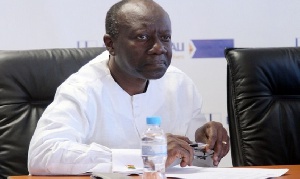After four successive years of government activity on the Eurobond market, Finance Minister, Ken Ofori-Atta, has hinted that government will not be making a return to the foreign capital markets, as it considers its options in financing its budget deficit.
The 2017 budget, presented last week, indicated that government will run a deficit of GH¢13.3 billion, which is about 6.5 percent of GDP. The deficit is expected to be financed from both domestic and external sources with the huge chunk coming from domestic sources.
“Net Domestic Financing is estimated at GH¢14.6 billion, equivalent to 7.2 percent of GDP, and includes financing from divestiture proceeds of GH¢1.8 billion. Net foreign financing is estimated to constitute a net repayment of GH¢1.3 billion, equivalent to 0.6 percent of GDP.
An amount of GH¢300.7 million, equivalent to 0.1 percent of GDP is estimated to be saved in the Ghana Petroleum and Contingency Funds while the Sinking Fund is expected to be drawn-down by GH¢716.1 million,” Mr. Ofori-Atta told Parliament last Thursday.
The planned foreign deficit financing, the budget indicated, will come from sources such as multilateral institutions with none coming from sovereign bonds, which has been the case over the past four years.
Government’s decision to steer clear off Eurobond may stem from the crippling cost of interest payments on the budget. Although government planned spending GH¢10.5 billion as interests payment last year, the figure rose to GH¢10.7 billion as the total public debt amounted to GH¢122 billion at year end.
Ghana’s maiden Eurobond, a US$750 million bond, was issued in 2007 at a coupon rate of 8.5 percent and matures this year. Four other bonds were issued between 2013-2016, all receiving mixed reaction from the market.
The country last issued a ten-year US$750 million bond with yield of 9.25 percent. The then Finance Minister explained that Eurobonds usefulness to Ghana’s economic strategy cannot be in doubt as it falls in line with the ‘smart-borrowing’ agenda of the government and that the bonds are not any different from other borrowing means.
But Mr. Ofori-Atta, presenting the Akufo-Addo-led government’s maiden budget, indicated a new dimension to government debt management strategy.
“As a sign of Government’s commitment to ensuring public debt sustainability within the framework of the Public Financial Management Act, the debt management strategy in 2017 envisages the introduction of new instruments to further lengthen the maturity profile of public debt, reduce cost/risk factors associated with the debt portfolio through effective liability management, and support the development of the capital market.
Mr. Ofori-Atta said the goal of government’s debt strategy for the medium-term would be to manage the public debt at the lowest cost and at prudent levels of risk to bring our debt to GDP ratio to 65 percent from its current 72.5 percent.
Business News of Tuesday, 7 March 2017
Source: B&FT
Ofori-Atta breaks Eurobond cycle
Entertainment












